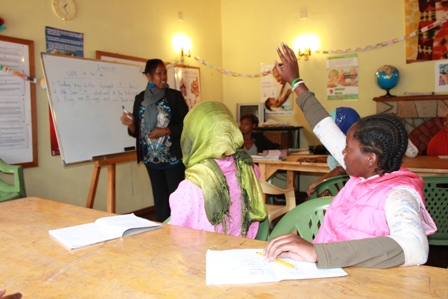visiting heshima: rebuilding dignity in Kenya’s refugee women

Refugee girls attending school at Heshima (Source: Heshima Kenya)
I’m in Kenya for four days en-route to Malawi. Instead of heading to all of the usual tourist haunts, I’m going to Heshima Kenya to meet the young women behind a growing movement in Africa; the move to empower women to be the change Africa needs through skills training and employment in creative endeavours.
Tucked away at the end of a bumpy dirt road in suburban Nairobi is Heshima Kenya – a non-profit organisation devoted to protecting unaccompanied and separated refugee children and youth. As of mid 2013, Kenya has over 620,000 refugees and other displaced persons. Heshima Kenya not only provides education and job opportunities for young refugee women, but also counselling, legal help for obtaining Visas, etc., and a safe house for those with nowhere else to go.
Heshima, which means “respect”; “honour;” “dignity” in Swahili, is also home to the Maisha Collective. The Maisha Collective (Maisha means “life” in Swahili) has become known internationally for the beautiful hand-dyed scarves the young women make. Walking into the Collective’s workshop, it is easy to see the positive impact Heshima has had on these young women. They laugh and chat animatedly, while their hands rapidly work.
Today there are only eight young women working – most of them are yet to return to work after the Christmas break. The group of young women, who come from Rwanda, Ethiopia, Somali, and the Democratic Republic of Congo (DCR), are working in pairs to wrap strips of tyre rubber around large bundles of black fabric.
The group welcomes me. They ask where I am from, how old I am, and if I am married – a standard opening conversation if you are a mzungu – white person – in Africa. I tell them I’m from Australia, 31 years old, and not married. I tell them of the sewing group I helped establish in Malawi and that I wanted to visit the Maisha Collective to learn what other groups were doing in Africa to help young women to become independent. Their faces light up: What does your group sew? When did you start working in Malawi? Do you know Swahili? The group moves in closer, some asking questions in Swahili to be translated by their friends, others asking in broken English. Now we have something in common.
A toddler runs into the garage, straight to one of the young women, his little legs tripping up as he moves faster than his feet know how to. The toddler face plants on the young woman’s lap. Amali*, 25-years old, from Ethiopia explains: ‘Most of us are single mothers. Our children attend the day care centre in Heshima,’ she says, dropping the strip of tyre rubber she is wrapping around a piece of fabric to point out of the garage doors towards another building nearby.
‘Heshima means a lot to me,’ says 20-year old Bushira*, from the DCR. ‘I am getting to finish my education and I am independent now because of the Maisha Collective. I can buy food and pay rent,’ she smiles proudly. ‘I can look after my child now.’
The young women all agree that with the help from Heshima Kenya, their lives will improve from now on. They are becoming financially independent and the money from the sale of the Maisha Collective scarves also goes towards helping new arrivals, as well as the ongoing psychosocial support needs of refugee women.
‘I will use the skills I have learnt at Heshima to one day open my own business,’ Amali says. ‘Although, my English is not so good.’
We continue chatting until it is time for the group to finish work for the day. As they pack away, I ask if I can buy a scarf from them. Amali asks me what my favourite colour is and the group shows me scarves in different patterns and colours. I choose two scarves – a blue one for me, and a pink and blue one for my sister. The tag on my scarf has a note stating who made it and where they are from – Amali, Ethiopia.
My new scarf means so much more to me now.
For more information on Heshima Kenya or the Maisha Collective visit http://www.heshimakenya.org
*Names have been changed
Emma Makepeace is a creative writing student at Queensland University of Technology. When she is not studying she works on women and children’s education and empowerment projects in Malawi, Africa, and daydreams about travelling the world.

